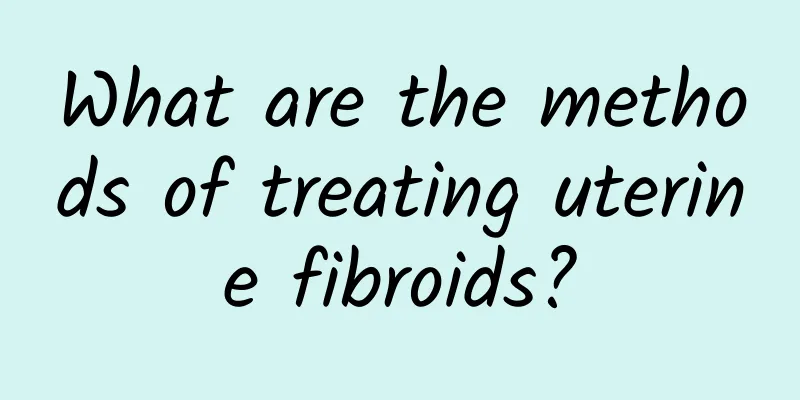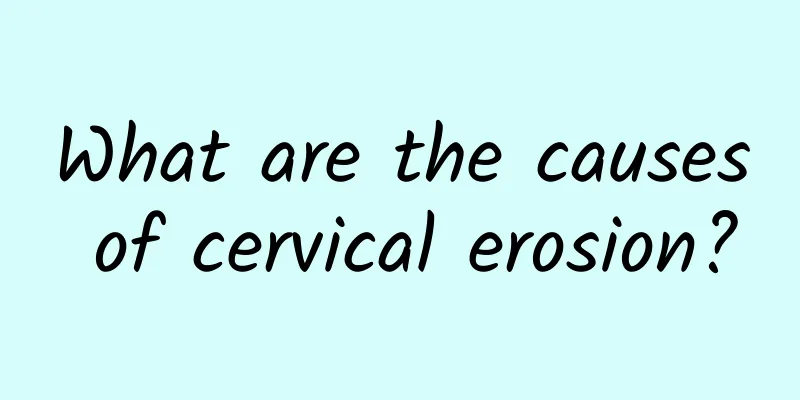Symptoms and treatments of uterine polyps Know these to understand uterine polyps

|
Uterine polyps are a common gynecological disease in women. They refer to all tumors attached to the uterine wall by thin pedicles, including endometrial adenomyoma polyps, endometrial polyps, malignant polyps, etc. Most of them are benign, or cause increased menstruation, vaginal bleeding, abnormal leucorrhea, uterine enlargement, pain, etc., but may have no obvious clinical symptoms. Hysteroscopic examination shows that polyps vary in size and pedicle length. Let's take a look at the early symptoms and treatments of uterine polyps . Early symptoms of uterine polyps 1. Swelling. If polyps occur in unmarried young women, such patients may experience swelling at the vaginal opening. 2. Uterine abnormalities. Patients may experience excessive menstruation, shortened menstrual cycles, or prolonged menstruation. Some patients may also bleed after sexual intercourse, with continuous menstruation. The amount of bleeding in some patients is even similar to that of menstruation. Some patients may also experience postmenopausal vaginal bleeding. 3. Abnormal leucorrhea. Patients may experience increased leucorrhea and bloody leucorrhea. A few polyps with larger pedicles may cause a small amount of vaginal bleeding, which may prolapse from the cervix, or bleed after sexual intercourse or when squatting and straining to defecate. If polyps ulcerate, become infected, or become necrotic, bloody or purulent leucorrhea may occur. 4. Infertility and miscarriage. Some patients with uterine polyps experience infertility or miscarriage. If the polyps grow in the cervical canal, it may hinder the entry of sperm into the uterine cavity, which will hinder the implantation of the fertilized egg or affect the development of the embryo. If they grow in the uterine cavity, it will lead to infertility and miscarriage. Treatment of uterine polyps Treatment principle: surgical resection is the main treatment. The treatment plan should be comprehensively considered based on the patient's age, fertility requirements, symptoms, polyp nature, growth rate, etc. Small focal or diffuse polyps are treated with curettage. Hysteroscopic polypectomy is the main treatment method. Attention should be paid to comprehensive curettage. After uterine cavity surgery, especially at the uterine fundus and uterine angle, anti-infection treatment should be performed. The following aspects should be noted: 1. If bleeding occurs, stop the bleeding first. 2. If accompanied by inflammation, control the infection first. 3. After surgical resection, the polyp should be sent for pathological examination. If there are signs of malignancy, treatment measures should be taken as soon as possible. 4. Perform surgery after inflammation is controlled. 5. This disease is prone to recurrence, and regular follow-up examinations should be conducted after surgery, once every 3 months. |
<<: What kind of exercise can help you recover after abortion?
>>: Is micro-tube visual painless abortion good?
Recommend
Experts explain important examinations before painless abortion
It is very necessary to do some examinations befo...
What should I do if I have abnormal leucorrhea after giving birth?
What should I do if I have abnormal leucorrhea af...
Is medical abortion painful? What are the precautions for medical abortion?
Today's society is becoming more and more ope...
Teacher Ma G shares 3 yoga tips to help you get rid of flared sleeves and belly fat
It's never too late to have beautiful lines. ...
What are the common symptoms of pelvic inflammatory disease?
Pelvic inflammatory disease is mainly divided int...
Diet adjustment is very important for patients with ovarian cysts
Ovarian cysts should be treated promptly. If trea...
1 whole grain rice dumpling only has 1 and a half calories
The Dragon Boat Festival is coming, and healthy a...
What are the causes of irregular menstruation? Can I still have children if I have irregular menstruation?
What should I do if I have irregular menstruation...
Symptoms of Trichomonas vaginitis
Trichomonas vaginitis is a common gynecological i...
Exercise helps reduce the risk of disease and cancer! Doctors teach 3 tips to develop a good habit of regular exercise
The World Health Organization points out that ins...
Luxurious lipolysis technology helps girls slim down for the hot summer
As the cherry blossoms bloom and the spring rain ...
How to treat cervicitis and cervical hypertrophy completely
Cervicitis and cervical hypertrophy are generally...
Several methods of treating cervical hypertrophy
Cervical hypertrophy is a common disease in women...
What fruits can't you eat after a miscarriage? You can't eat oranges
You cannot eat oranges after an abortion. Oranges...
If you have vaginitis, your leucorrhea will have many abnormalities
If you have vaginitis, your vaginal discharge wil...









